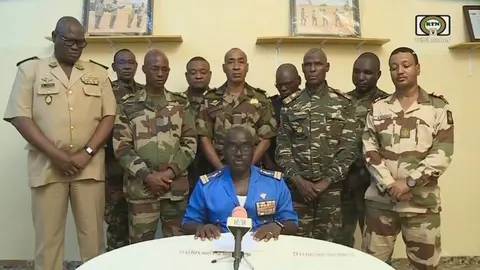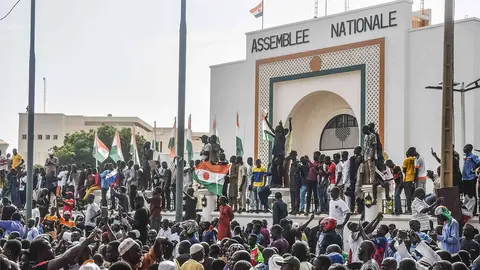Wildfires raging in the Sahel

With the expiry of the deadline granted by the Community of West African States (ECOWAS) to the coup plotters in Niger, everything suggests that confrontation in this strategic Sahel country is inevitable. An unprecedented conflict within ECOWAS itself, but also for the Maghreb and the countries of southern Europe, with Spain at the forefront of the consequences of this confrontation.
Catherine Colonna, the French Foreign Minister, described it as "one coup too many", after those in Mali (2020) and Burkina Faso (2022), thus admitting that Niger marks a before and after, the turning point at which it may be necessary to "act decisively and with determination" (President Emmanuel Macron) so that the West in general, and Europe in particular, do not lose this new African branch of the global war that is already being waged.
The straw that breaks the camel's back is often neither the thickest nor the biggest, but it is the one that has caused the most decisive and bloody outbursts throughout history. This is also the case in Niger, where the coup was triggered by a personal dispute between the ousted and "kidnapped" president, Mohamed Bazoum, and the head of his Presidential Guard and now chief coup leader, Abdouharamane Tiani.
If the coups in Mali and Burkina Faso marked the definitive decline of French post-colonial influence in Africa, already badly affected by a deterioration of political-diplomatic relations with Morocco and Algeria, the case of Niger is the rash that demonstrates the state of crisis not only within the continent, but among the new world blocs.
The Sahel is the frontline between jihadist terrorism and the international community. The latter, far from abating, is intensifying without the most affected countries in the strip being able to contain it, both with the help provided so far by the French special forces (1,500 soldiers still stationed for this purpose in Niger) and the European forces that support them, including the Spanish. Brussels rightly fears not only a considerable increase in jihadist terrorism, but also a consequent increase in migratory flows. If the destination of these flows is Europe, initially arriving on the coasts of the Canaries, Andalusia, Murcia, Sicily, Molise, Apulia or Calabria, in the intermediate African stages, i.e. Mauritania, Morocco, Algeria, Tunisia and Libya, the risk of destabilisation is at its highest.
The controversy within the African countries is already raging, provoking a clash between opposing visions. The military intervention threatened by the chiefs of staff of the armed forces of several ECOWAS countries is not unanimous. Abdelmadjid Tebboune, President of Algeria, which has a 1,000-kilometre border with Niger, points out that "direct military intervention would be a threat to Algeria, without whose help there will be no solution [to the conflict], with the risk that the whole Sahel will go up in flames".
This is not the view of Nigeria, the continent's most populous country (215 million inhabitants), Côte d'Ivoire and Senegal, which have already taken the lead in such a military intervention, with an initial contingent of 50,000 soldiers. Nigeria's President Bola Tinubu does not have the full backing of his country either. A large group of senators have urged him to strengthen political and diplomatic options before leaning towards a military counter-attack. By contrast, Côte d'Ivoire's President Alassane Ouattara does appear to have mass support for his proclamation that, in addition to "condemning the coup attempt in Niger, which seriously threatens peace and security in the region, it is essential to restore constitutional order and allow the democratically elected President Bazoum to exercise his functions".
And the Niger coup plotters are certainly not about to retreat. They have stepped up popular demonstrations in their favour, notably through rallies of support at the Seyni Kountché stadium (named after Niger's first coup leader in 1974) in Niamey, as well as receiving external backing from the current leaders of Mali and Burkina Faso, who have described the advocated military intervention in Niger, still the world's fourth largest producer of uranium, the essential fuel for the 56 reactors in France's nuclear power plants, as "an aggression that would be met with a full and forceful response".




